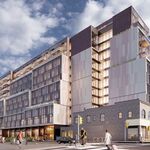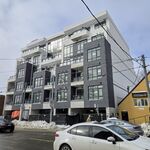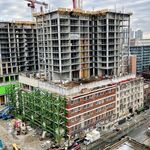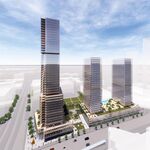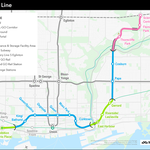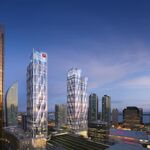In the past few days two influential political and economic bodies, the Ontario PC Party and the Toronto Region Board of Trade, have independently released transit proposals that call for big shakeups in how transit is administered in the GTHA.
On Saturday the Ontario Progressive Conservative Party, gearing up for the June 7, 2018 election, released its platform. While it expectedly offered policies on a wide range of topics, it's the transit portion that caught the eye of us here at UrbanToronto. In particular, there are four items that deserve a closer look.
The first is their commitment to projects that are already "under construction", including the Ottawa LRT project Phase 2, Hamilton's LRT project, Kitchener-Waterloo's LRT project, and the Finch West LRT project. It should be noted that only two of those projects, the Kitchener-Waterloo Ion LRT and the Finch West LRT, are actually under construction, with the other two to begin in 2018. Despite this minor mixup in project status, the pledge to honour existing project commitments is a welcome change from the party's 2014 campaign, where they pledged to cancel many of these projects if elected.
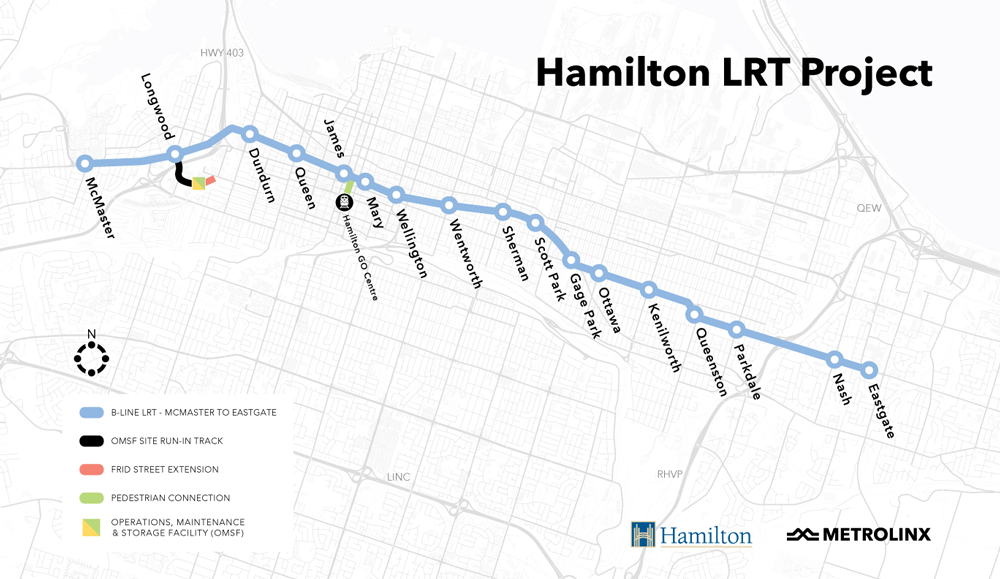 The Hamilton LRT, one of the projects the PCs intend to proceed with, image courtesy of Metrolinx
The Hamilton LRT, one of the projects the PCs intend to proceed with, image courtesy of Metrolinx
The second is their pledge to "fulfill the existing commitments to two-way all day GO train service". One thing that is not clear however is whether this is intended to mean a commitment to the GO RER program, which includes a 15 minute service commitment as well as electrification and additional stations, or whether this is a commitment to merely increasing frequencies and operating hours. The Liberals have closely tied most GO-related announcements to the 'branding' of the GO RER program, so the PCs may be reluctant to use that term in their platform. Over the coming months, PC Leader Patrick Brown will surely be asked to clarify his party's position on whether this is a distinction without a difference, or if what his party is proposing does in fact differ from the GO RER program.
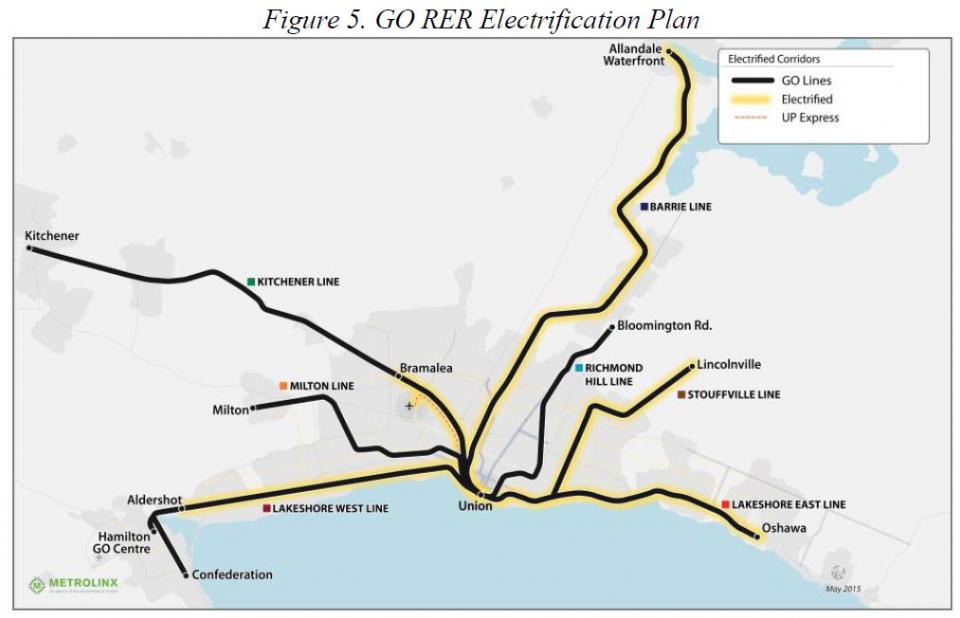 Metrolinx's GO RER plan, image courtesy of Metrolinx
Metrolinx's GO RER plan, image courtesy of Metrolinx
The third is a pledge to "commit an additional $5 billion to build new subways in the Greater Toronto Area". The commitment to additional transit funding is certainly commendable, yet when one examines the three subway projects that are specifically listed (the Relief Line, the Yonge Subway extension to Richmond Hill, and the Scarborough Subway extension), the challenge becomes glaringly obvious.
The PCs pledge that they will assume the City's share (nearly $1 billion) of the Scarborough Subway extension, and that they will fund the Relief Line (estimated at $6.8 billion for just the southern portion), and the Yonge Subway extension ($5.6 billion). $5 billion in funding to cover $13.4 billion worth of projects? "Houston, we have a problem."
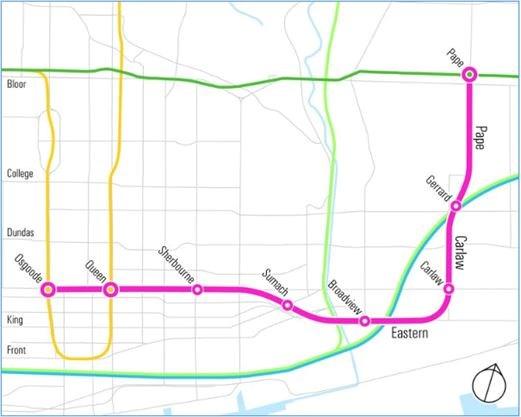 The approved alignment of the Relief Line South, estimated at $6.8B, image courtesy of the City of Toronto
The approved alignment of the Relief Line South, estimated at $6.8B, image courtesy of the City of Toronto
The fourth is the one that has caused the biggest stir, and that is to have "the provincial government assume responsibility for the maintenance and investments in Toronto's subway infrastructure". The platform stresses that the TTC would "continue to own the fare box and the profits generated from it", meaning that the upload to the Province would be in name only, similar to the agreement reached on the Crosstown LRT.
This isn't the first time that the PCs have proposed this. In 2012, former PC Leader Tim Hudak floated the idea of uploading the TTC Subway network to Metrolinx, the Provincial agency in charge of transportation in the GTHA. The plan was critiqued at the time by former Toronto City Councillor and TTC Chair Karen Stintz, who stated that "any transfer of [the] TTC to Metrolinx or any provincial body should be an 'all-or-nothing' proposition", a sentiment still echoed by many today. The fact that the PCs have modified their position in that Toronto would be able to keep the subway's revenue is a step in the right direction, however.
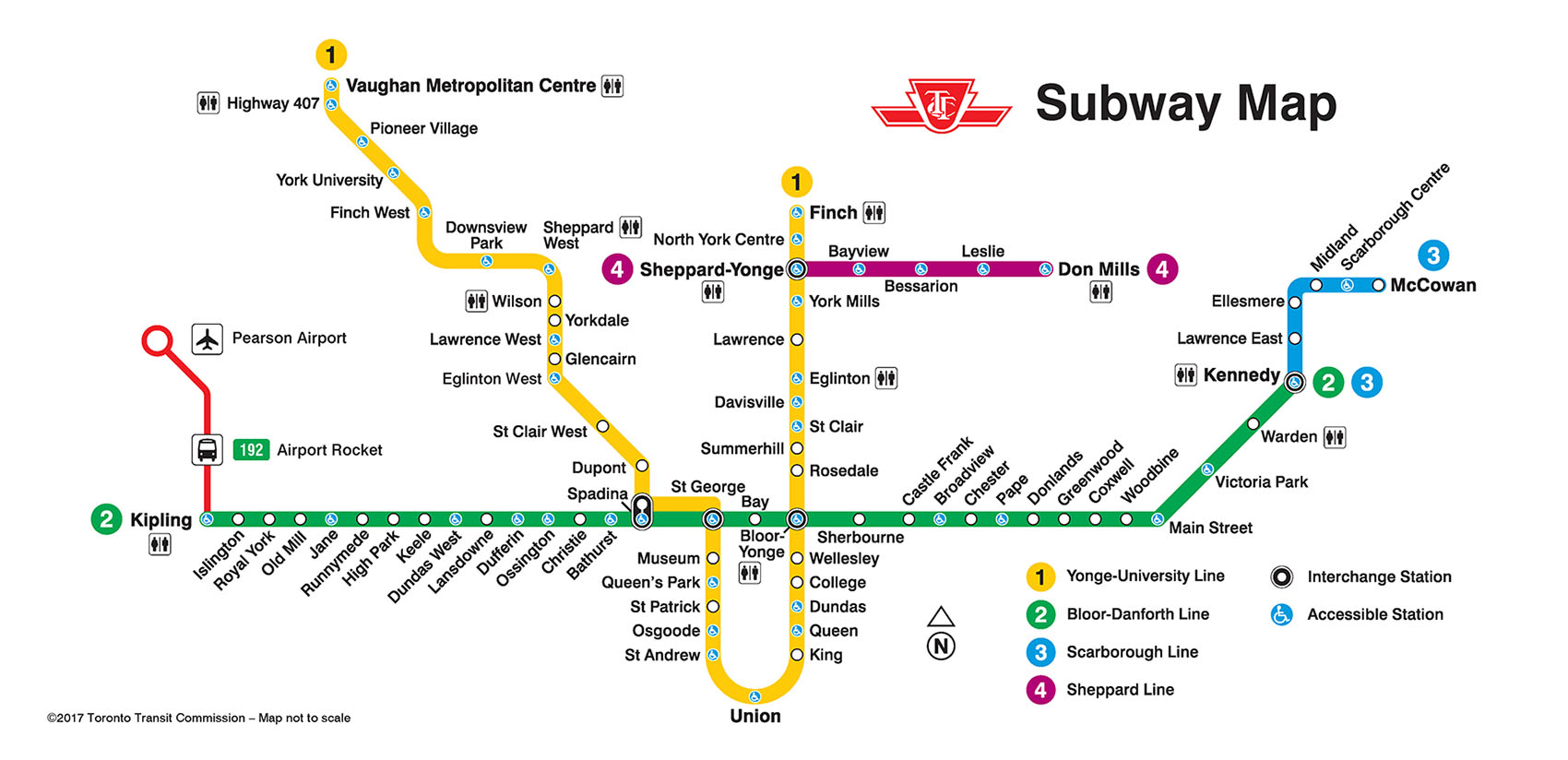 The TTC Subway system, which the PCs want to upload to Metrolinx, image courtesy of the TTC
The TTC Subway system, which the PCs want to upload to Metrolinx, image courtesy of the TTC
The second proposal of note comes from the Toronto Region Board of Trade (BoT), with a proposal they are calling "Superlinx". In essence, they are proposing that all transit operations in the GTHA (including Waterloo) be uploaded to the Provincial Agency Metrolinx, in line with other examples like Translink in the Greater Vancouver Area, and the MTA in New York City.
The report states that the "Superlinx agency will have authority over transit planning, operations, expansion and asset management. Consolidation will allow the agency to improve services, find efficiencies and maximize the value of its assets." Also, in perhaps a subtle jab at the recent PC platform, they state this "proposal also has the virtue of simplicity, avoiding the coordination problems created by partial uploads of only planning authority or rapid transit lines."
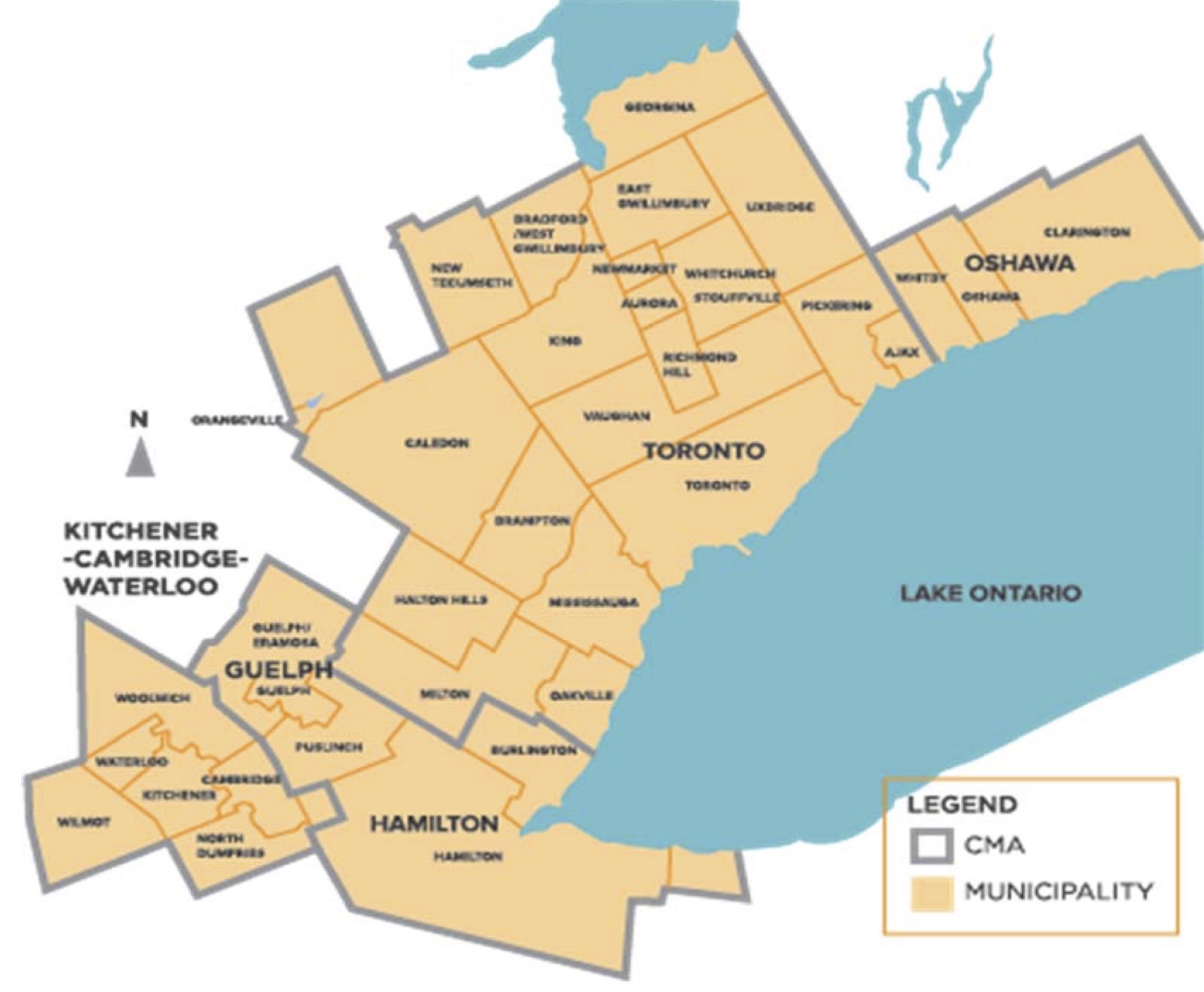 The proposed coverage area of "Superlinx", image courtesy the Toronto Region BoT
The proposed coverage area of "Superlinx", image courtesy the Toronto Region BoT
In terms of the structure of the Superlinx Board, the BoT proposes that "at least half of all of its members will be Independent, Non‐Executive Directors (INEDs). These directors would include business leaders and transit experts, as well as representatives of private capital who invest in the agency’s commercialization efforts." The remaining positions would be appointees from the Provincial and Municipal governments, with most being from the Province.
While this proposal is certainly visionary and would solve many issues surrounding transit today, UrbanToronto believes that retaining some local control would be beneficial. A way to do that could be to have the new Metrolinx structured into subdivisions such as Planning, Rapid Transit, Toronto, Durham, York, Peel, Halton, and Hamilton (Kitchener-Waterloo seems a step too far). In this scenario, Planning would encompass much of what Metrolinx is currently doing, while Rapid Transit would operate all rapid transit lines (TTC Subway, GO, LRTs, BRTs) across the GTHA. The remaining divisions would be responsible for operating the local transit networks within their respective geographies. Large enough to be cohesive, small enough to be responsive.
With regards to the agency's Board, the BoT proposal certainly has merit, though we would suggest that the Mayors of Toronto and Hamilton, as well as the Regional Chairs from the Regional Municipalities be included as well, as a stronger tie to the municipalities that fall under Metrolinx's service umbrella.
The BoT does mention independent revenue streams, though primarily in the form of real estate development of Metrolinx-owned properties, including station sites. While this is certainly a worthwhile avenue to pursue, it's unlikely to come even close to covering the year-to-year operating expenses of the agency, let alone the capital expenses. As a result, we believe that some form of dedicated revenue stream from the Province would be necessary. This could be in the form of an increase in the Provincial income tax for GTHA residents going directly to transit (offset by a reduction in municipal property taxes for a service municipalities no longer need to deliver), or in the form of a sales tax. Getting politics out of planning starts with not having to receive transit funding directly from politicians.
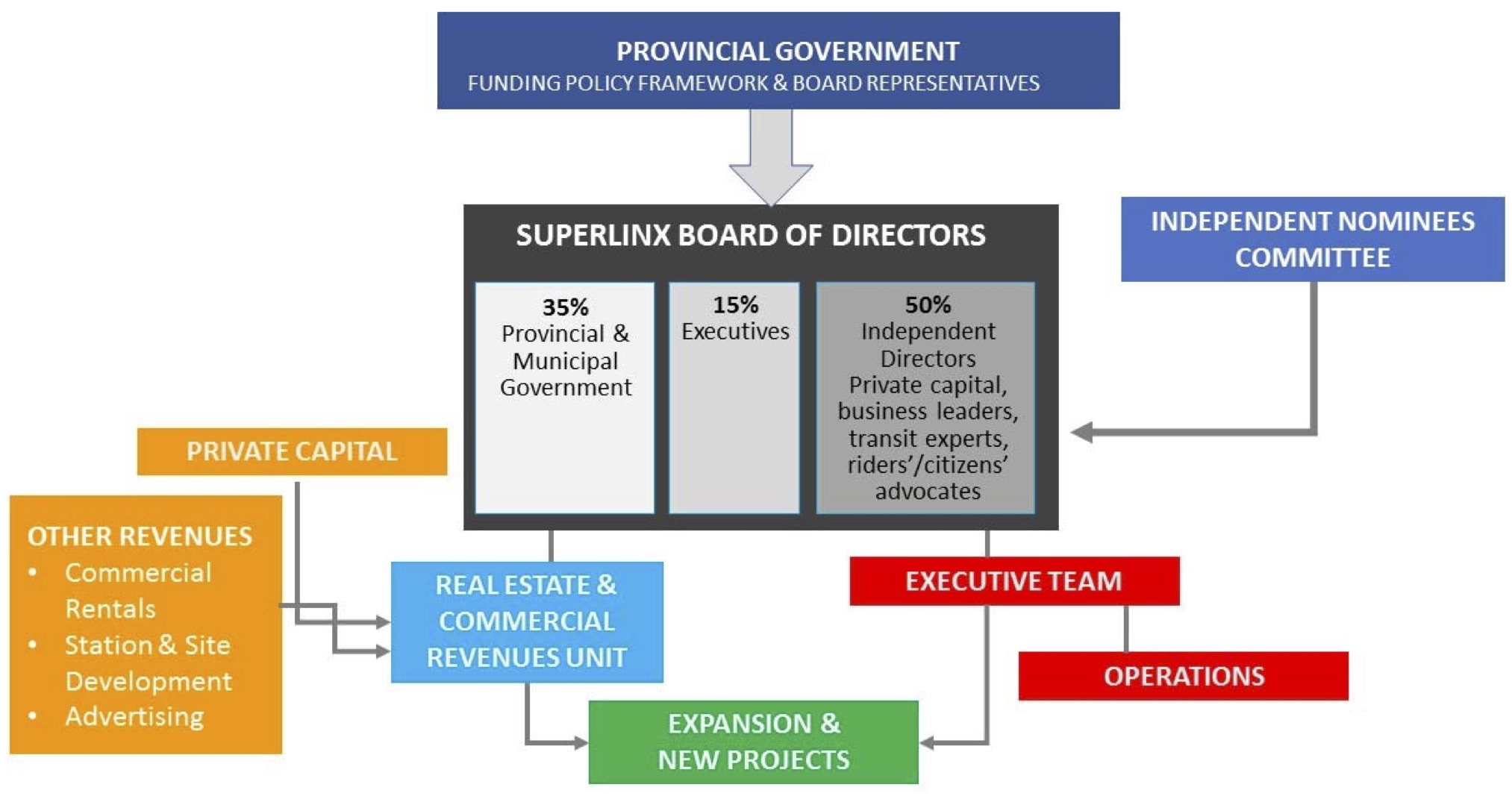 Organizational Chart of "Superlinx", image courtesy the Toronto Region BoT
Organizational Chart of "Superlinx", image courtesy the Toronto Region BoT
This new Metrolinx needs to be big enough to eliminate the inter-agency issues (particularly surrounding fare integration), but local enough to efficiently respond to resident issues at the route level. It needs to be beyond the reach of municipal politicians to tinker with or veto multi-billion dollar transit plans, but still give municipalities some degree of input into the planning process. It needs to have planning decisions made by experts, and not by politicians pretending to be so. And finally, it needs to have an independent revenue stream, because a Provincial Agency cannot truly be 'independent' from Queen's Park when Queen's Park still controls the purse strings.
If you would like to join the discussion on these transit plans, you can do so in our forum thread, or by leaving a comment below.

 3.5K
3.5K 














